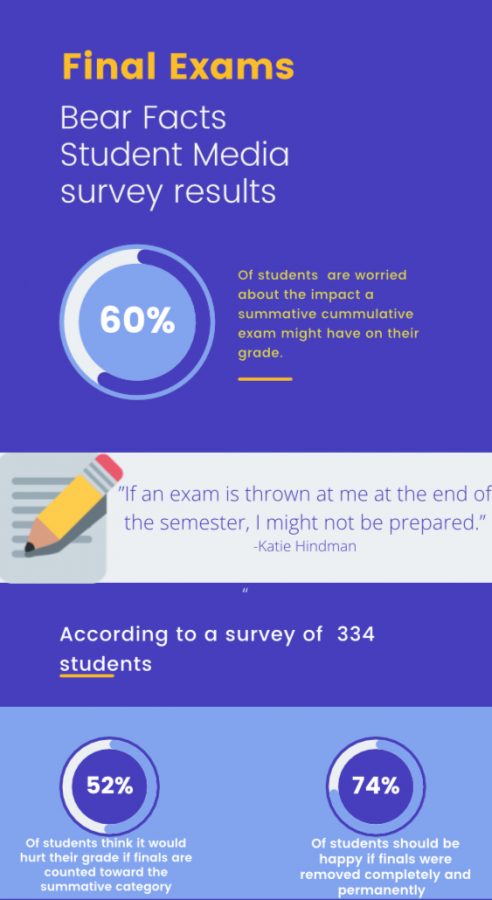The future of finals
Photo by Mackenzie Rough
According to a Bear Facts Student Media survey of 334 students, the cancellation of finals has caused confusion among students.
Traditional final exams are being discontinued, but a lot of students are worried about what the impact will be.
In early November, students received an email saying that the final exam schedule and category had been removed, though teachers could still assign a comprehensive summative assessment/project. While the majority of students were happy about the removal of traditional final exams, many students didn’t like the idea of having a summative test covering the entire semester.
According to a Bear Facts Student Media survey of 334 students, 75% of students were happy about the removal of traditional final exams, however many students were worried about the impact a cumulative summative assessment might have on their grade.
“I usually study really hard for finals so that they either raise my grade or have don’t change it at all,” Katie Hindman, senior, said. “But now I’m not even sure what all of my classes are doing, so if an exam is thrown at me at the end of the semester, I might not be prepared.”
Hindman is not alone in her concerns; 52% of students believe that having a cumulative test in the summative category could have a negative impact on their grade.
Contrary to what some students believe, however, individual teachers are not able to make the decision to give out final exams; according to Lauren Katzman, literacy division head, “teachers will be talking in their PLCs, their professional learning communities, to decide what [the course they teach] is going to do at the end of the semester.”
What this means for students is that teachers cannot make the decision to hand out final exams without the consolation of other teachers in their PLC. Additionally, many teachers are not giving cumulative tests at all.
According to Anne Hopkins, science teacher, “Honors Biology will have a project on cellular structure, which is something that we have assigned for the last two years, excluding last year. For AP Biology, we’re just giving students a review, since they have to take the AP test next semester,” Hopkins said. “I don’t know what other classes are doing, but I’d assume that they’re doing something similar.”
Hopkins says that she thinks the new protocol is less stressful on students and allows for “more and different learning experiences,” however some students think that there is a lack of communication. “I’m not really sure what my teachers want from me… I don’t really know if my teachers are doing [finals] or not. It’s not really being communicated well enough.” Hindman said.
While many students are unhappy about the changes, Hopkins says that she doesn’t think any real feedback can be given before the new practices have been carried out.

Going into her senior year, this is Mackenzie’s second and final year on staff and her first year as News Editor. She looks forward to graduating and...

